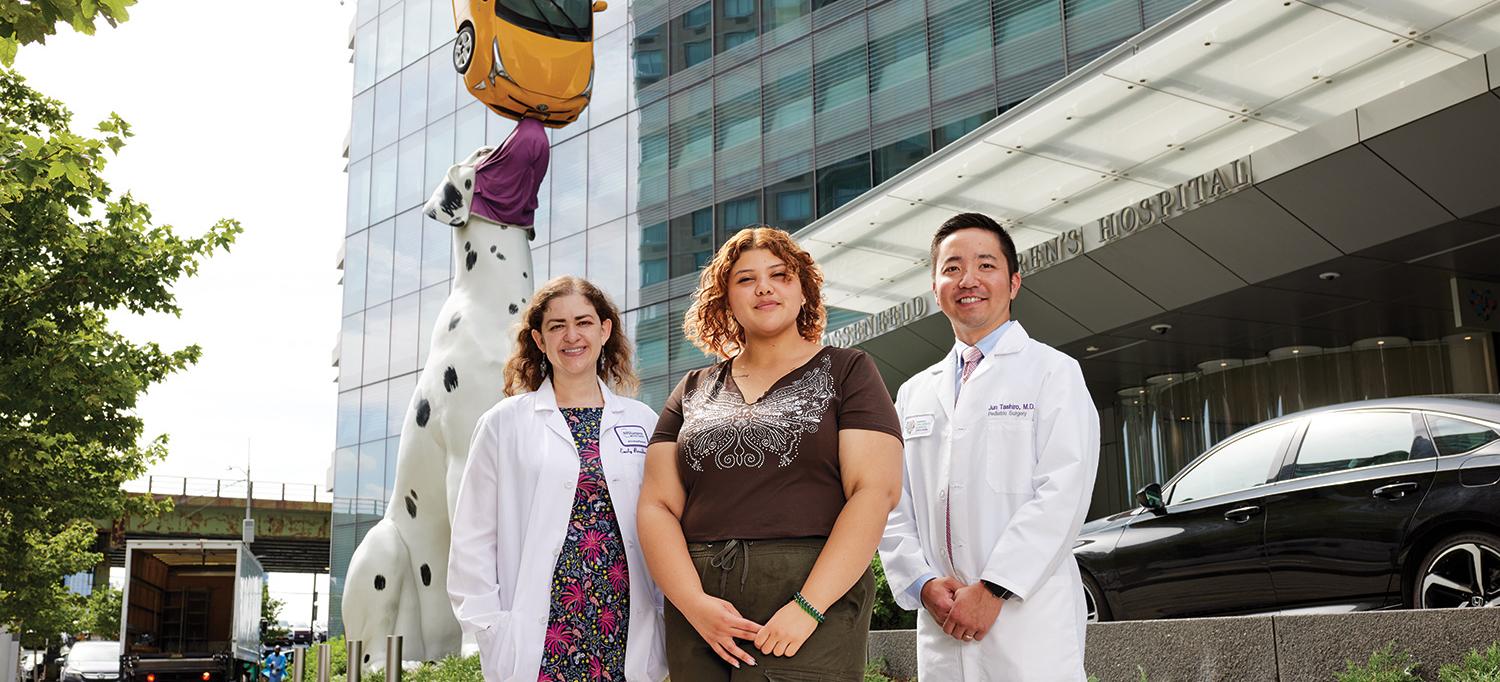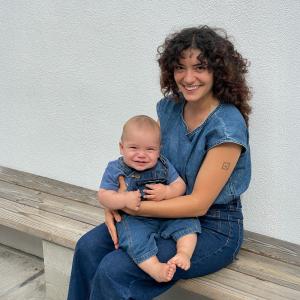
Dr. Emily Breidbart, medical director of the Adolescent Healthy Weight Program, and Dr. Jun Tashiro, surgical director of the program, collaborated to create a treatment plan for their patient, Mariana Castrillon.
Photo: Jonathan Kozowyk
Mariana Castrillon’s childhood was a succession of diets that never stuck and dance classes that failed to help her slim down. During an annual checkup when she was 12, a doctor bluntly told her, “You’re fat. You need to lose weight.”
But Mariana’s internal dialogue was even more judgmental. At amusement parks, she hesitated to go on rides out of fear she wouldn’t fit in the seat. “I had a lot of smaller friends, and shopping with them was really embarrassing,” she says.
By the time she was 15, Mariana weighed more than 300 pounds. She found a new pediatrician, Camille Senzamici, MD, with NYU Langone Medical Associates—Washington Square. That one doctor’s visit changed Mariana’s life.
“I started talking to Mariana about her weight and how it affected her self-esteem and mental health,” says Dr. Senzamici. “We also talked about the health risks. She already had high blood pressure and was at risk for diabetes.”
The conversation left a lasting impression on Mariana. “When Dr. Senzamici told me I was at higher risk for diseases that I knew already ran in my family, I said ‘Oh, no, I don’t want that,’” recalls Mariana. “She then asked me if losing weight was something I was interested in, and worded it in a way that made me feel comfortable.”
Dr. Senzamici referred Mariana to the Adolescent Healthy Weight Program at Hassenfeld Children’s Hospital at NYU Langone, which provides medical and surgical weight loss treatment for teens 13 and older who have a body mass index (BMI) of 35 or higher. By the time Mariana enrolled in the program, her BMI was 49.
“I used to be so anxious around food. But I learned that food is fuel, and if I am eating nutritious food that gives me energy, then I shouldn’t have negative thoughts about it.”—Mariana Castrillon, who had bariatric surgery at age 17 and has lost nearly 90 pounds
Mariana is far from alone. Federal data from 2017–18 showed that more than 19 percent of children age 2 to 19 (about 14.4 million) were affected by obesity. During the COVID-19 pandemic, that percentage jumped to 22 percent, hitting those who were already overweight or obese the hardest.
Until 2021, bariatric surgery for adolescents was performed at NYU Langone’s Tisch Hospital in Manhattan by adult general surgeons from NYU Langone’s Weight Management Program. In the summer of that year, board-certified pediatric surgeon Jun Tashiro, MD, MPH, became surgical director of the Adolescent Healthy Weight Program. His arrival allowed adolescent bariatric surgery to move to Hassenfeld Children’s Hospital—34th Street.
“Adolescents should receive adolescent medical and surgical care that is focused on their unique needs,” says Dr. Tashiro. “Postoperative follow-up is key to helping teens maintain long-term weight loss. Our team at the Adolescent Healthy Weight Program provides all of that. The program is designed to help teens reach their goals.”
Combining Medical and Surgical Weight Loss Approaches
Mariana met first with Emily Breidbart, MD, medical director of the Adolescent Healthy Weight Program, who evaluated Mariana’s overall health and connected her with the program’s nutrition counselor. But then COVID-19 hit, and Mariana’s treatment was put on hold. Combined with the stress and isolation brought by school closings and stay-at-home orders, Mariana gained another 40 pounds. By the time her treatment with Dr. Breidbart resumed, she weighed more than 360 pounds. She managed to lose 20 pounds through diet and exercise, but it became clear to Dr. Breidbart that Mariana needed a more advanced strategy to reach her goals.
“Bariatric surgery was the best option for Mariana to decrease her risks of long-term obesity-related health issues,” says Dr. Breidbart. “She was a great candidate: mature, realistic about what it would take to prepare for bariatric surgery and the steps after, and very motivated.”
Dr. Tashiro recommended sleeve gastrectomy, a minimally invasive laparoscopic procedure that is the preferred bariatric surgical option for adolescents. Gastric bypass, another surgical option, is more invasive, rerouting the digestive system to reduce calorie absorption. During sleeve gastrectomy, up to 80 percent of the stomach is removed, taking an organ that is roughly the shape of an eggplant and making it resemble a banana. The smaller stomach makes a person feel fuller faster and releases fewer hunger-stimulating hormones. Both of these factors aid weight loss.
NYU Langone’s adolescent bariatric surgery program is accredited by the Metabolic and Bariatric Surgery Accreditation and Quality Improvement Program as a comprehensive center providing high-quality patient-centered care for adolescents and adults. Dr. Tashiro, who has performed more than 100 bariatric surgeries in his career, started performing the procedure at Hassenfeld Children’s Hospital in August 2021. Interest in the program has grown steadily.
Bariatric Surgery for Teens: Safe and Effective
Bariatric surgery for teens is a relatively new phenomenon. The first procedures were performed nearly 20 years ago, and at the time, there was skepticism that a surgical solution that changed a growing child’s anatomy was appropriate. Research now looking into two decades of surgical outcomes shows that bariatric surgery is successful at treating obesity in teens with no adverse impact on growth or development.
A National Institutes of Health study looking at the long-term results of 240 teens who had bariatric surgery showed that 5 years after the surgery, teens lost 26 percent of their body weight, and most were able to stop taking diabetes and blood pressure medications. Research by Dr. Tashiro, published in the journal Surgical Endoscopy, showed that adolescents as young as 13 who received a sleeve gastrectomy benefited from long-term weight loss at the same rate as adolescents who are 16 or 17 years old. Addressing obesity earlier helps teens get back on track, both physically and mentally, without waiting until their later teenage years, Dr. Tashiro says.
Mariana felt certain that without surgery, she would just continue to gain weight, and that was not what she wanted as a then-17-year-old. “I was a senior in high school. I had prom coming up, and college,” says Mariana. “I didn’t want to go into adulthood with the weight I was carrying.”
Mariana’s surgery took place on October 21, 2021. “Dr. Tashiro and his team were the kindest people I’ve ever met,” Mariana says. “They never made me feel bad or insecure. Before the surgery started, I remember they had ‘Don’t Stop Me Now’ by Queen playing, and that was just awesome.”
Indeed, there is no stopping Mariana now: Eight months after surgery, she has lost nearly 90 pounds. Beyond the number on the scale, she has more energy, sleeps better, enjoys more physical activity, and eats smaller portions with more vegetables—all of which will help Mariana achieve lasting weight loss. She graduated from high school and is leaving her home in the Bronx to attend the State University of New York Buffalo State College in the hopes of becoming a special education teacher.
“I used to be so anxious around food,” says Mariana. “Was I eating too much? Too fast? Were people watching me eat? But I learned through the Adolescent Healthy Weight Program that food is fuel, and if I am eating nutritious food that gives me energy, then I shouldn’t have negative thoughts about it.”
Mariana’s positivity is apparent, says Dr. Tashiro. “She is at such a great spot in her life, and she’s just beaming.”
Dr. Senzamici agrees. “She has her whole life ahead of her, and it’s a healthier one,” she says.

